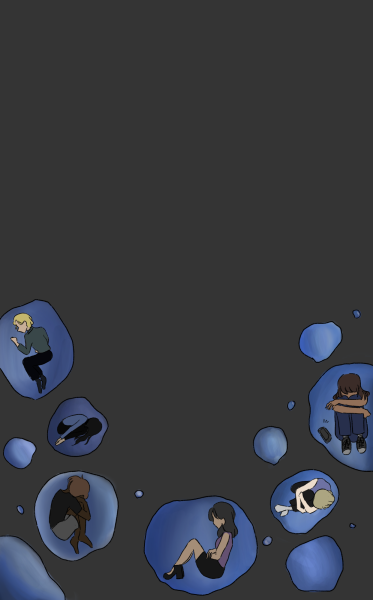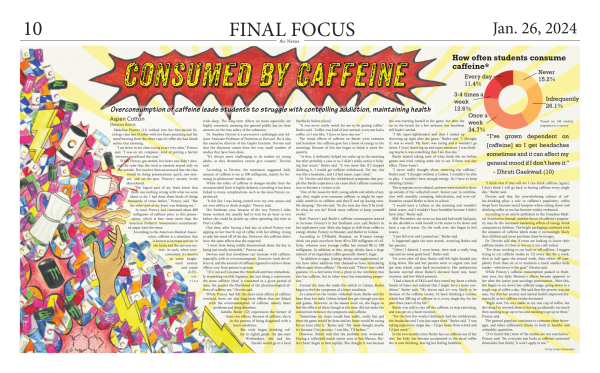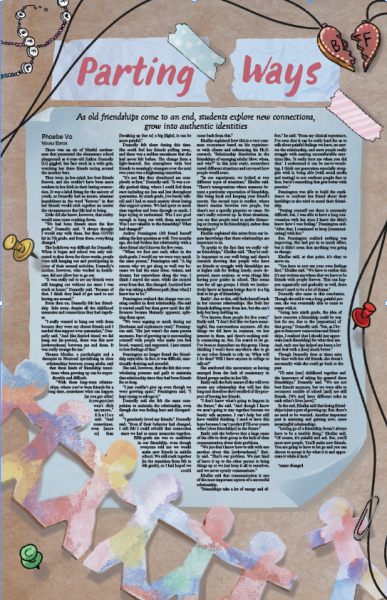Using Humor to Cope
Students struggle to process emotions, find comfort in humor
May 6, 2022

While other seniors were stressing and finishing their college application essays at the last minute on Nov. 30, Austin Pierce (12) was taking a nap.
As the 11:59 p.m. deadline hit, high school seniors took a sigh of relief as they submitted their applications just within time. Unfortunately, Pierce’s two-hour nap was harder to wake up from than expected and he submitted his application at 12:03 a.m., three minutes late. While this was a serious issue, Pierce said that he could only laugh about what happened, simply brushing it off in a self-deprecating fashion as he was just “being Austin,” and such “a big procrastinator.”
Pierce tried to laugh it off. He made himself the butt of his own joke, avoiding any negative feelings about the event.
“I never really felt disappointed,” Pierce said. “I never really sat down and thought ‘Oh my god, this is such an opportunity that I just squandered away because I couldn’t wake up from a nap and because I started writing my essay the day of. It didn’t hit me. I just made a joke and moved on.”
Dr. Melanie Booth-Butterfield, a former professor of communication studies at West Virginia University said that Pierce is not alone when it comes to using humor as a coping method.
“[In] response to a stressful situation, humor is one tool people enact,” Booth-Butterfield said. “Humor is used to ‘defuse’ the stressor, resulting in increased handling of the problem, better mood, less conflict, etc.”
For the most part, humor can be very helpful when it comes to coping with stressful situations. But Booth-Butterfield emphasized that its effectiveness can depend on the type of humor used.
Humor tends to be classified as either affiliative, self-enhancing, aggressive, or self-defeating. In a study titled “Individual differences in uses of humor and their relation to psychological well-being,” Dr. Rod A. Martin and his colleagues used a questionnaire to gauge common humor styles and their effects, creating these four categories.
In this situation, Pierce was using a form of self-defeating humor to avoid the seriousness of his issues. Self-defeating humor is typically used by making yourself the butt of jokes to enhance interpersonal relationships, which can result in the humor becoming a form of denial while coping. This is something that Pierce said he does often, out of habit. Pierce’s use of humor feels almost instinctual, he said, adding that he even regrets his reliance on humor.
“[It has gotten to the point where] if there was a funeral I had to go to, I wouldn’t be grieving,” Pierce said. “Instead, I’d be trying to think of a way to make a joke. And I hate that about myself because you can only go so far [ignoring the serious].”
According to Booth-Butterfield, humor can often be used negatively.
“Humor as a coping mechanism [becomes negative] when it is overused, aggressive or violates the norms of the group you’re dealing with,” Booth-Butterfield said. “Some people also overuse humor to avoid dealing with difficult issues.”
For Pierce, the habitual nature of his humor inadvertently led him to use it in situations where it was inappropriate, losing friendships as a result. Because humor is a part of his identity, Pierce said he feels as though he cannot stop using it. Nonetheless, Pierce still wishes that he could be better about the way he relies on humor because his jokes made it harder for him to see the gravity of a situation. With his tendency to make things light-hearted, he has started to genuinely believe that serious situations are light-hearted and unimportant. This has caused him to become apathetic not only to his own issues but to his friends’ problems as well. In turn, it became harder for Pierce to avoid using aggressive humor that is detrimental to others and includes put-downs, sarcasm, and other humor that comes at the expense of another person.
“Once, one of my closest friends texted me a few months ago saying ‘Austin, I can’t see myself being friends with you,’” Pierce said. “It was because I would always take her issues and make jokes about them. That really affected me for a while. I had to really reflect [on the fact] that I was a really bad friend.”
Pierce said that his humor often feels like a performance he puts on for others and a way to just avoid his issues.
“[The performative nature of it] can sometimes feel like no one really understands you,” Pierce said. “A lot of people don’t really understand that there’s more meaning behind my humor and that it’s not always just a joke. That can be really painful and isolating to deal with.”
Similarly, Ananya Narayanan (12) used self-defeating humor to avoid addressing her mental health issues.
For Narayanan, humor was a way to pretend that a stressful situation wasn’t serious. At the beginning of high school, her primary concern was to be perceived as emotionally and mentally stable. This concern ultimately culminated in the desire to avoid talking about her mental health so conversations wouldn’t be emotionally stressful or awkward.
“I’m too uncomfortable to sit someone down and just have a conversation with them about something so serious,” Narayanan said. “In reality, it’ll be affecting me and be serious, but I don’t want to convey that to other people. I want everyone to have the impression of me that I’m fine. So I feel like if I joke about it, then others will think that I must be okay with it.”
Dr. Melissa Wanzer, a Professor in the Communication Department at Canisius College, worked with Booth-Butterfield to study the patterns of humor use and its effectiveness as a coping strategy among college students. Wanzer said that while using humor to cope can make it easier for others to talk and laugh with someone about their issues, it can still be negative when overused.
“When humor is used excessively to avoid problems that need to be managed, that seems to be unproductive,” she said. “I think this happens in healthcare situations sometimes. For example, a patient comes in and jokes about a health issue and this response may send the wrong message to the provider. When some people are nervous or uncomfortable, we joke around, and doing this may indicate that the issue [is] not that serious, when in fact it is.”
Narayanan said that understating her mental health has become so natural to her that she is often hesitant to share her issues with her friends.
“[Even though] I trust these people, I don’t want it to be a whole big deal where they feel bad for me and they feel like I need an intervention,” Narayanan said. “I want to be able to talk about things and have people just listen, but I feel like if I am serious about it then it becomes bigger than I want it to be.”
Although this humor originated from a desire to avoid facing her mental health issues, Narayanan also said that without her humor she wouldn’t have been able to start important conversations at all.
“Quarantine gave me time away from other people and the understanding that while coping through humor is something that can be helpful, I need breaks from it,” she said. “Being away from people and not [constantly] making jokes was when I realized that sometimes [I need to be serious about things].”
Now, Narayanan said that she uses humor in a more constructive way, otherwise known as self-enhancing humor which benefits the joke-maker and enables them to laugh at their own failings and situations constructively. By posting videos on Tiktok, where she is able to freely joke about her issues, Narayanan found a community of people who intimately related to the stress she experienced while coming out. Narayanan said that this has encouraged her to be more comfortable with herself and open up about her feelings. This has particularly been the case with her jokes and content on Tiktok.
“I have used Tiktok to vocalize things about myself that I’m not ready to do in a serious manner or in real life,” Narayanan said. “Joking on Tiktok makes me feel like the whole world [can relate to my experience]. Being able to see different people from all over the world deal with the same things is really validating because it proves that I’m not the only one.”
Narayanan also uses humor to gauge how they would react to her coming out by making jokes about having a girlfriend or dating someone in the friend group. Booth-Butterfield said that using humor can help a person better understand how someone else might fit into their life. “Prosocial humor is often a positive coping mechanism,” she said. “It lightens the mood, breaks the ice, and shows the person [can] be open to ideas and not mean.”
Similarly, Kaili Contreras (12) uses an affiliative form of humor to find friends and a community through humor. Affiliative humor is typically beneficial for relationships and involves spontaneous joke-telling or banter. She said that using humor to cope and connect with others is one of the main reasons that she has become friends with those around her.
“The humor and jokes make it a lot easier to form friendships with other people who have the same experiences,” Contreras said. “When I hear them joke about [their own issues], it makes it more comfortable and more of a safe space because I know they will relate.”
According to Booth-Butterfield, this is because when humor is appropriately communicated, it can be a great way to find community, friends and partners.
“Almost everyone responds positively to humorous communication, especially affiliative and positive humor,” Booth-Butterfield said. “Similarities in our sense of humor, or what makes us laugh, are the basis for [many] friendships.”
From Contreras’ jokes about her dad leaving to humorous stories of workplace issues and drama, humor provides her with a sense of greater control over her issues.
“If it’s a situation regarding adults like my parents or my bosses, I often feel powerless over the situation or feel really small,” Contreras said. “But being able to joke about it in a light-hearted way feels more like I have that control.”
Wanzer said that this feeling of control comes from the ability to manage your reactions to stressful situations, something often done through humor.
“[In a study] a nurse once shared, ‘If we did not use humor, we would cry,’” Wanzer said. “Laughing [instead of crying] at something traumatic may indicate that I can control or manage this situation. At the moment, I can control how I react to the situation, and I choose to laugh. I was diagnosed with breast cancer about six years ago and I used humor throughout my treatments [to help] me to feel more in control of what was happening. We can’t always control the bad things that happen to us, but we can control how we respond.”
While humor helps Contreras control her reactions to stressful situations, she said that humor is also often a necessary starting point for her processing her emotions.
“[Joking helps me] come to terms with how frustrating a situation is,” Contreras said. “It helped me understand the situation and also not get into such a negative mindset about it. The more serious I am about something, the more upset I’ll be later on about it. So [making it a light-hearted story] really helps me process it.”
Unfortunately, Contreras’ jokes have unintentionally led others to believe that they can make similar comments and jokes about her problems. However, she was eventually able to establish boundaries and use humor more productively.
“The older I got, the easier it was to understand the situation, [how to set boundaries], and think about humor as a coping mechanism in a more responsible and rational way,” she said. “With humor, I think that I can now reflect on [my problems] a lot easier, especially now that I have more resources to use it more constructively.”
For Contreras, one benefit of using humor to cope comes from being able to develop and protect her personality amidst traumatic situations.
“A lot of people don’t want to lose their sense of self when they go through traumatic events,” she said. “It feels empowering in a way to make the traumatic event or stressful issues I’m dealing with my own by incorporating my humorous personality into it.”
According to Booth-Butterfield’s research, many people–from people in grief, to students, classroom teachers, office supervisors, and nurses–turn to humor to cope in stressful situations.
“[Humor] is just a part of [a person’s] repertoire of skills, a skill that works for them to get people to like them, want to be with them, help them, and even get them out of trouble,” Booth-Butterfield said. “We found in the grieving studies that humor draws people to you. When people allow their humor to show and don’t feel that they have to be grieving all the time, they cope better.”
Beyond these emotional and mental health benefits of using humor, Booth-Butterfield said that humorous coping can also lead to various physical health benefits like reducing headaches, insomnia, and other ailments.
Although humor is something that we can benefit from using, like all other coping mechanisms, it is important to use humor in a healthy way. Wanzer said that awareness is one of the most important things to have when using humor to cope.
“When you use humor to cope frequently, it is important to be honest with friends and family,” Wanzer said. “Sharing [how you may still feel sad despite your jokes] may be helpful so that people will be aware that even though the person is joking and seems okay, the person might still need support and care. At the same time, people who use humor to cope need to be aware of when they may be overusing it to avoid problems they should deal with such as serious mental and physical health concerns.”
Since learning how to do this, Narayanan says that humor has only been positive in her life. Narayanan even finds strength and comfort in the performative actions, like reenacting traumatic events or framing issues as interesting stories.
“The performative action behind coping through humor feels empowering,” Narayanan said. “Once, I made a TikTok reenacting the time when I first came out. [If I made that a few years ago,] I would have felt a lot worse, but looking back at it now, it feels validating. I think the performance, in a way, shows how far I’ve come and grown to be in a place where I can make jokes and control the story instead of struggling during a traumatic or stressful situation.”












